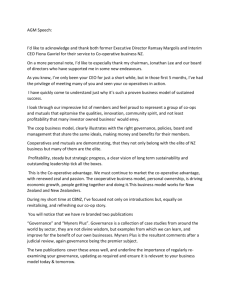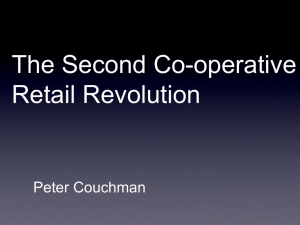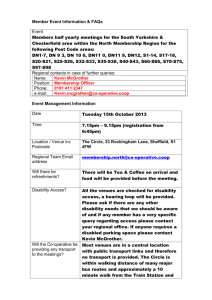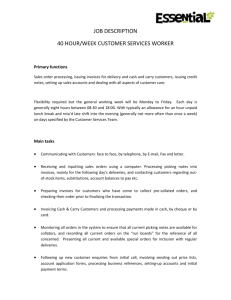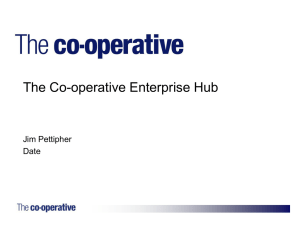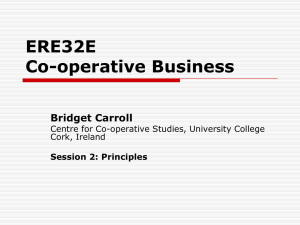of the people, by the people, for the people co
advertisement
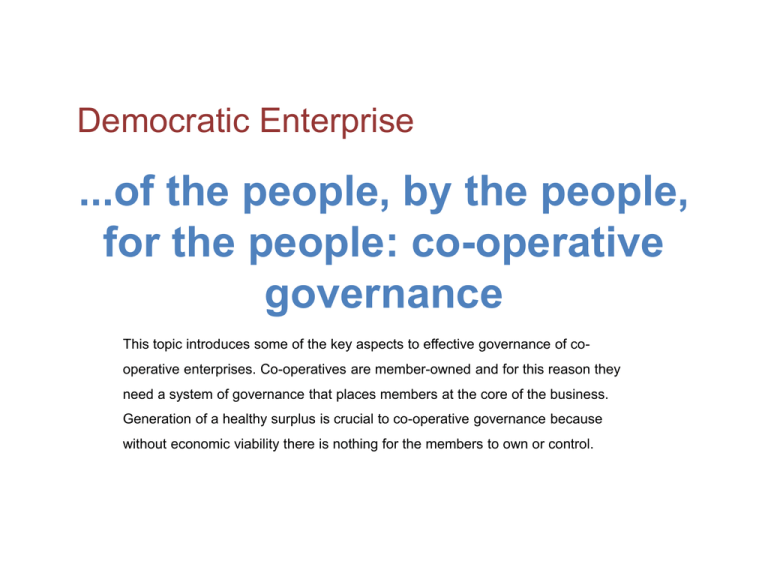
Democratic Enterprise ...of the people, by the people, for the people: co-operative governance This topic introduces some of the key aspects to effective governance of cooperative enterprises. Co-operatives are member-owned and for this reason they need a system of governance that places members at the core of the business. Generation of a healthy surplus is crucial to co-operative governance because without economic viability there is nothing for the members to own or control. Learning Goals • outline the core elements of co-operative governance; • analyse the application of democratic theory of governance in co-operative enterprises; • explain the relationship between the roles of members, management, and the board of directors in a co-operative. Key Arguments • Co-operative governance is based on a system of personal rights rather than property rights as is the case in an investor-owned company. • Members can exercise their right to participate in governance by voting directly on long-term business decisions and policy, as well as electing a board of directors to represent member interests. Election is conducted on a one member/one vote basis. • The effective governance of a co-operative is dependent on the members, board of directors, and management working together to achieve the co-operative’s objectives. • Education, training, and information are vital for members to be able to participate effectively in the governance of the co-operative. Introduction Corporate governance has become an area of increasing importance and debate in enterprises of all kinds. Extreme failures of corporate governance have heightened its importance: • Enron, Worldcom in early 2000s. • The financial crisis 2008 - ? Corporate governance Points to note: • The purpose of the organisation is vital in determining an appropriate system of governance. • An effective system of corporate governance must balance the needs of accountability and performance. • Good corporate governance must be based on principles rather than prescription. • Good corporate governance is as much about supporting and enabling management as it is directly controlling their behaviours. K. Keasey, H. Short, and M. Wright, ‘The Development of Corporate Governance Codes in the UK’ in K. Keasey, S. R. Thompson. and M. Wright (eds), Corporate Governance: Accountability, Enterprise and International Comparisons (West Sussex: John Wiley & Sons Ltd, 2005), pp. 22-3. Co-operative governance (1) Members are placed at the core of the governance of a co-operative. They have the final or ultimate authority; this is usually only exercised at the AGM or EGM. Similar to an investor-owned firm? Co-operative governance (2) Democratic participation Operations management Not always in balance! Overview of co-operative governance Members Elect Accountable to Board of Directors Hire Report to Management Co-ordinates Employees Capital Physical resources Meet needs of Members Democratic theory of governance (1) Democratic theory asserts that ultimate control rights in an organisation lie with those who are directly affected by the operations of the enterprise. In the case of co-operatives this means the members. A democratic system of governance is based on the concept of personal rights as opposed to property rights in capitalist firms. Democratic theory of governance (2) Personal right - a personal right is a right that belongs to an individual because the person satisfies some objective criterion e.g. being a citizen of a country. Personal rights are nontransferable. Property right – a property right is a right that can be purchased, transferred or acquired e.g. shares in an investor-owned company. Decision making in cooperatives At the highest level, co-operatives make decisions democratically – one member/one vote. Co-operatives can adopt a number of methodologies for decision-making (based on democratic principles). Decision making methods Consensus – everyone needs to agree on a matter before a decision can be taken. It can be difficult to implement because it runs the risk of members reaching a decision that nobody wanted. Simple majority – for a decision to be taken, more than fifty per cent of the members must be in favour of a particular outcome. This method is generally quicker than consensus as there is no need for discussion or persuasion. A simple majority, however, can alienate a large proportion of the membership. Supermajority – requires a large proportion of the membership to vote in favour of a decision before it can be taken. It is at the discretion of the worker co-operative as to what this proportion may be but it is usually over seventy-five per cent. Potentially fairer than the other two methods. Speed and quality of decision making Decision making in co-operatives has often been criticised as too slow, as it involves high levels of consultation and participation. On the other hand, the decisions taken using this method could be of higher quality (considered, measured approach, ‘wisdom of crowds’). True/False? ‘The Rules’ The governing document of a co-operative (known as ‘the rules’) sets out how the business is to be governed. Typically, a co-operative’s rules will contain details pertaining to the admission of members, the functions of the board, how meetings should be conducted, and other related governance issues. The role of the members, board and management The effective governance of a co-operative is dependent on the members, board of directors, and management working together to achieve the co-operative’s objectives. There are three key aspects to ensure these groups function interdependently: • each group needs to understand their roles and responsibilities; • there needs to be effective communication between all three groups; • each group needs to regularly engage in the governance system of the co- operative. Ontario Cooperative Association. ‘Co-operative Board & Governance Part 1’. http://www.youtube.com/watch?v=1RUb463Up0w&feature=related, accessed 16 June 2011. The role of members A member’s primary role is to exercise democratic control over the organisation. They can do this in three ways: 1. Voice – represents the way in which members can influence decision-making and policy in the co-operative by expressing their views to the board and management. 2. Vote – directly influence decision making by voting on major business decisions at the AGM. 3. Exit – member can leave the co-operative quite easily (they don’t need to find a buyer for their shares). Serious risk to the co- Member responsibilities • Understand the co-operative: its purpose, objectives, structure, operations, benefits and limitations. • Electing, removing and evaluating directors. • Assist in the formulation of policy • Provide necessary capital. • Patronise the co-operative. • Participate in decision-making. • Provide information. • Help obtain new members. The role of the board of directors (1) The board of directors oversee the operations of the business and ensure the co-operative is directed towards achieving its objectives. The board of directors in a co-operative has two main roles: • represent member interests; • provide strategic direction for the enterprise. Is there conflict between these roles and what happens if there is? The role of the board of directors (2) Cornforth argues that the board of a co-operative must not function according to just one theory (democratic – representing member interests). He highlights four key areas in which the simultaneous roles of a board may cause tension: • The role of the board as representatives and experts. • The role of the board in driving performance and ensuring conformance. • The role of the board in controlling and supporting management. • The accountability of the board to members and other stakeholders. C. Cornforth, ‘Making Sense of Co-operative Governance: Competing Board responsibilities • Formulate policies acceptable to members. • Hire the general manager (CEO) and hold them accountable. • Set long-term business objectives. • Evaluating the performance of the co-operative. • Act collectively not individually. • Sourcing and managing capital. The role of management (1) The primary role of managers in a co-operative is to implement the strategic objectives of the business through the management of day-to-day operational activities. Management, in co-operation with the board of directors, is responsible for ensuring the co-operative realises its purpose or mission. The activities managers pursue must be in the best interests of members. Management responsibilities • Put into action the policies decided by the board. • Serve in the best interests of the members. • General management functions. • Report to the board. • Hire employees. [i] Davis corroborates this requirement for co-operative managers to be grounded in the co-operative values and purpose. He argues that only through such manag Managerial competence in cooperatives Type of competence Specific elements Information and understanding of co-operative valuebased management Information and understanding of customer interface management Information and understanding of multi-business management Information and understanding of community development Identification with co-operative values Readiness to speak out Co-operative value-based management skills Customer interface management skills Community development skills Collective and participative decision-making skills Visionary leadership skills Knowledge Attitude Skill P. Tuominen, I. Jussila, and N. Rantanen, ‘Managerial Competence in Consumer Cooperatives: Inducing theory from empirical observations’ International Journal of Cooperative Management 5 (2010): 9–22. Success of co-operative management Compliance with co-operative values and principles Co-operative identity Leadership Factors that influence the success of cooperative management Endogenous Management ability to adapt to the needs and changes of the environment Co-operative integration Exogenous Government policies Co-operative legislation P. O. Ortega, ‘Agricultural Co-operation in Spain. Developing research goals and a literature review on the issue of success factors for cooperative management applied in the case of an olive oil co-operative’ The International Journal of Co-operative Management 5 (2010): 46–53. Importance of engagement and participation Members must understand their rights and responsibilities and have appropriate incentives to participate. Birchall and Simmons propose that member involvement and participation can be motivated by three factors, known as collectivistic incentives: • shared goals; • shared values; • sense of community. A sensible membership strategy is needed in order for a co-operative to engage its members successfully. R. J. Ridley-Duff, ‘Communitarian Governance in Social Enterprises: Case Evidence from the Mondragon Cooperative Corporation and School Trends Ltd’ Social Enterprise Journal 6 (2010): 125–45. J. Birchall, J. and R. A. Simmons, ‘What Motivates Members to Participate in Co-operative and Summary • Co-operative governance is based on a system of personal rights rather than property rights which is distinct from the system in an investor-owned company. • Members can exercise their right to participate in governance by voting directly on long-term business decisions and policy, as well as electing a board of directors to represent member interests. This is conducted on a one member/one vote basis. • The effective governance of a co-operative is dependent on the members, board of directors, and management working together to achieve the co-operative’s objectives. • Education, training, and access to information are vital for members to be able to participate effectively in the governance of the co-operative. Resources and Support UK Corporate Governance Code http://www.frc.org.uk/corporate/ukcgcode.cfm. University of Wisconsin Co-operative Governance resources http://www.uworker co-operativec.wisc.edu/issues/Governance/index.aspx. Co-operantics http://www.cooperantics.co.uk/. SAOS best practice guide to governance http://www.saos.co.uk/home/documents/SAOSCGEFFP.pdf. Co-operatives UK codes of practice http://www.uk.coop/tags/resources/Codes%20of%20practice. References and Reading Abrahamsen, M. A. Cooperative Business Enterprise. New York: McGraw-Hill, 1976. Birchall, J. and R. A. Simmons. ‘What Motivates Members to Participate in Cooperative and Mutual Businesses?’ Annals of Public & Cooperative Economics 75 (2004): 465–95. Ellerman. D. P. The Democratic Worker-Owned Firm. London: Unwin Hyman Ltd, 1990. Ridley-Duff, R. J. ‘Communitarian Governance in Social Enterprises: case evidence from the Mondragon Cooperative Corporation and School Trends Ltd’ Social Enterprise Journal 6 (2010): 125–45. United States Department of Agriculture. ‘Cooperative Member Responsibilities and Control’ Cooperative Information Report 1, Section 7, 1990.
